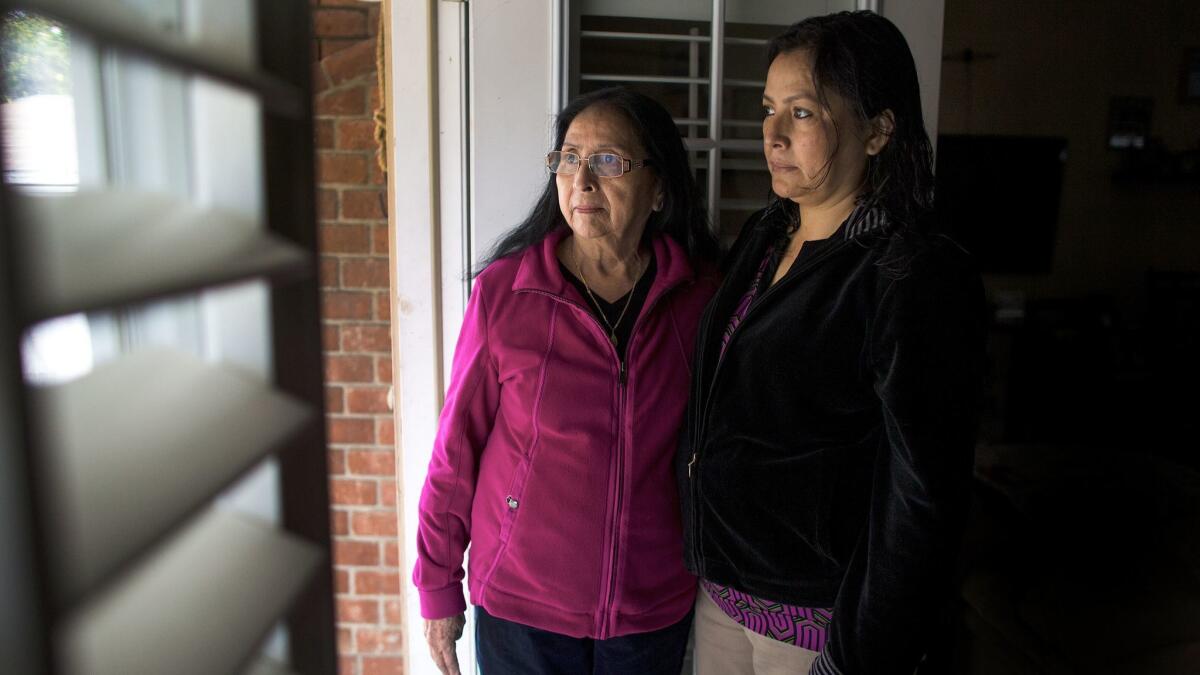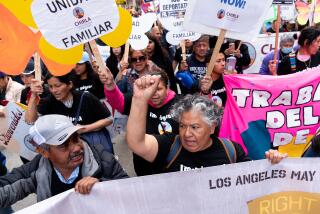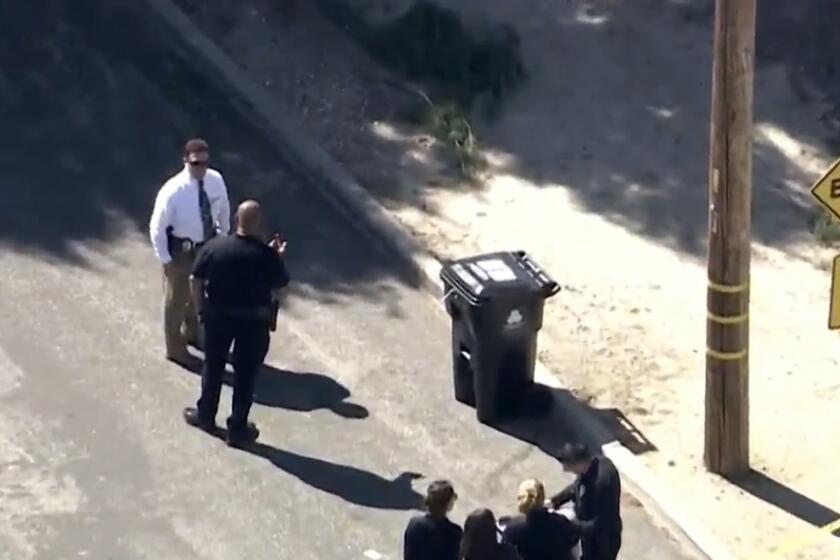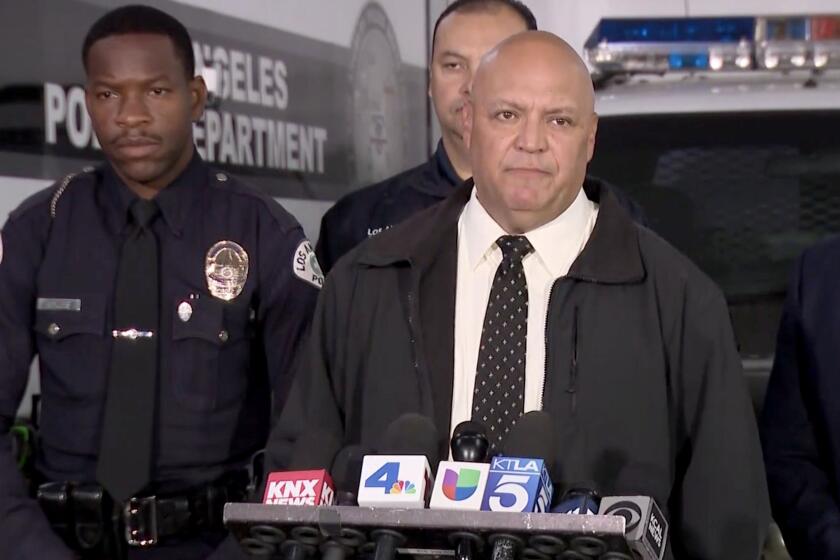Immigrants fear that definition of ‘criminal’ will be stretched under Trump

Mayra Machado had a well-paying job as an ophthalmologist’s assistant that allowed her to drive her three children in a BMW to back-to-back school activities in her suburban Arkansas town.
Few knew that her own mother brought her as a 5-year-old illegally to the United States from El Salvador to escape civil war. Machado was raised in Santa Ana by her grandmother, moving in with her estranged mother in Fayetteville, Arkansas, after graduating from high school.
There, a teenage Machado forged her friend’s signature on a $1,500 check.
------------
FOR THE RECORD
Dec. 5, 3:10 p.m.: This article states that low-level crimes that are considered deportable offenses can include immigration or traffic violations. According to enforcement policies set by the Department of Homeland Security in 2014, minor traffic offenses and any crime for which an essential element is immigration status are excluded and do not make a person eligible for deportation. Also, the article said that Mayra Machado, who has spent a year in immigration detention, had pleaded guilty to one felony charge involving a forged check 12 years ago, when she was 18. She pleaded guilty to three felony charges in the case: forgery, theft by receiving and failure to appear. Also, a previous version of this article referred to Kris Kobach as a former attorney general of Kansas. He is the Kansas secretary of state.
------------
Machado, then 18, pleaded guilty to a felony charge — but the real cost of her crime bore down on her 12 years later when it popped up after a routine traffic stop and set her on a course to be deported to El Salvador.
“I was an everyday soccer mom,” she said during a phone interview from a detention facility in Louisiana. “I’m not a bad person. I shouldn’t be here … I’m not a threat to society and I’m not going to hurt anybody. I should be taking care of my children.”
Machado’s arrest underscores a growing fear among immigrant advocates: that deportation policies that began under the Obama administration are likely be wielded to even more draconian effect during the presidency of Donald Trump, who made promises to crack down on illegal immigration a cornerstone of his campaign.
Under immigration law, Machado is considered a “criminal alien.” It’s a term repeatedly used by Trump during his campaign to describe people who he would target for deportation. Trump frequently cites the case of Juan Francisco Lopez-Sanchez, a Mexican national who had been repeatedly deported before returning to the United States and fatally shooting Kathryn Steinle in San Francisco.
Some immigrants in the country illegally do have serious criminal histories. But others have committed low-level crimes that are considered deportable offenses but are relatively minor, such as immigration or traffic violations. In some states, like Georgia, driving without a license is a misdemeanor and a priority deportable offense. Entering the country illegally in itself is a misdemeanor.
Some immigration advocates believe these more minor offenders will be swept up under a Trump crackdown.
After his victory, Trump told CBS’ “60 Minutes” that his administration would deport between 2 million and 3 million criminal aliens.
To reach that number, Trump would likely have to go beyond violent criminals.
A 2013 Department of Homeland Security report found that an estimated 1.9 million “criminal aliens” resided in the U.S. But that encompasses any foreign-born person who has been convicted of a crime in the U.S, including immigrants in the country illegally, legal permanent residents and people with temporary visas who have a criminal conviction.
A 2015 study of immigration and population data by the Migration Policy Institute, a think tank in Washington, concluded that about 820,000 of the 1.9 million “criminal aliens” are in the country illegally. About 300,000 had felony convictions and an estimated 390,000 were convicted for serious misdemeanors. The rest — about 130,000 — were convicted for low-level offenses, such as immigration, nuisance or traffic violations.
Whether Trump delivers on his promises to crack down hard on immigrants in the country illegally is unclear. But he has made hardliners like Alabama Sen. Jeff Sessions — whom he has tabbed as U.S. attorney general — and Kansas Secretary of State Kris Kobach notable figures in his transition.
According to two senior officials in his transition team, Trump’s advisers will try to widen the deportation net to include migrants who have been charged but not convicted, suspected gang members and drug dealers, and people charged with such immigration violations as illegal reentry and overstaying visas, as well as lower-level misdemeanors.
During the Obama administration, about 2.5 million immigrants — both those in the country legally and illegally — were deported.
The administration created a large, robust system that ramped up cooperative arrangements between local and federal immigration officials, pushing a large number of people into the country’s deportation and removal system.
“What’s happening to this poor woman is happening under Obama,” Olga Tomchin, a spokeswoman and staff attorney for the National Day Laborer Organizing Network, said of Machado. “Now he’ll turn over this huge and vast deportation machinery to Trump, who will make things worse than they already are.”
That worries people like Benjamin Suy, a street vendor in Los Angeles who is in the country without legal status. Suy, 34, sells corn on the cob smothered in lime, chili powder and mayonnaise for $2 out of a shopping cart so he can provide for his wife and four children in Guatemala.
Like many other vendors in similar situations, he sells food without a license, saying he can’t afford to pay the money necessary to get licensed. He’s worried that a misdemeanor conviction for selling food without a license from three years ago could make him a priority for deportation under Trump’s presidency.
“I’m just trying to make a living. I work 15 hours a day. I’m not hurting anyone. I’m not out stealing. Nobody has died from eating my food. I’m not selling something dangerous,” he said.
On Wednesday, L.A. Council members Joe Buscaino and Curren Price announced they would introduce a new policy that would prevent street vendors who are in the country illegally from being charged with misdemeanors penalties, which they said could put many at risk for deportation under Trump’s presidency.
“We want to make sure that with this administration coming, that we can make them less vulnerable,” Buscaino said. “These are individuals who are providing for their families and doing everything they can to put food on the table.”
In some cases, an accusation alone can land people in deportation proceedings.
Xochitl Hernandez, a 40-year-old from Los Angeles, faces deportation after officers arrested her in February during an LAPD-Immigration and Customs Enforcement raid in East Hollywood designed to capture a robbery suspect.
Hernandez, who has been in the country illegally since age 10, was visiting a friend’s home when the raid occurred. ICE agents took her into custody after a LAPD officer accused Hernandez of being gang affiliated.
Although Hernandez was never charged with a crime stemming from the raid, the gang allegation was enough to make her a priority for removal from the U.S. In August, in a letter addressed to an official in ICE’S Enforcement and Removal Operations, LAPD Chief Charlie Beck wrote that a “further inquiry” revealed that Hernandez was not wanted by police, was not identified as the subject of criminal activity and was “not the subject in any law enforcement database that identifies her as a known gang member.”
While acknowledging that this was outside of the LAPD’s purview, Beck added that an internal review appeared to show that Hernandez’s case did not meet the federal “procedural deportation priority definition.”
The chief added: “We would like to reiterate that the policy of the LAPD is that our law enforcement actions are not solely based on an individual’s immigration status.”
“She’s identified as a top priority for deportation because a single officer said she is gang affiliated,” said her attorney Emi MacLean. “But there is zero basis, not a single document that says she is gang affiliated.”
After spending several months in immigration detention, Hernandez was eventually released but still is fighting her removal from the country.
Machado is still detained in La Salle Detention Facility in Louisiana. On Dec. 5, she’ll have spent nearly a year away from her children.
After her arrest 12 years ago, she spent four months in a boot camp — where her head was shaved and she had to perform military drills. Last year she was on her way to pick out a Christmas tree with her children when she stopped in Washington County, Arkansas.
A sheriff’s deputy arrested her after noticing she had an unpaid traffic ticket. Before Machado could pay the fine, another deputy authorized as an ICE agent ran her name — and up popped the old felony, setting her on a course to be deported to El Salvador.
For Machado, who picked up a California accent from a childhood lived far from her homeland, it’s a stunning turn after years of transforming herself into the parent teachers would turn to when they ran low on snacks at school.
“I never thought I would go through this,” said Machado, who was abandoned by her mother as a child. “I always said I would be there for my kids. I would be that parent who never left their kids.”
Follow Cindy Carcamo on Twitter @thecindycarcamo
Times staff writers Esmeralda Bermudez and Brian Bennett contributed to this report.
ALSO
What Jeff Sessions could do on immigration as attorney general
A board set up to investigate Border Patrol shootings and deaths has cleared agents every time
More to Read
Start your day right
Sign up for Essential California for news, features and recommendations from the L.A. Times and beyond in your inbox six days a week.
You may occasionally receive promotional content from the Los Angeles Times.







